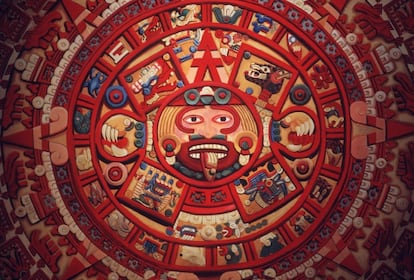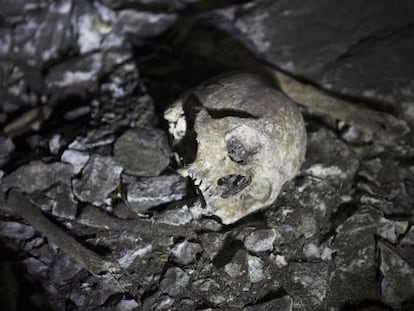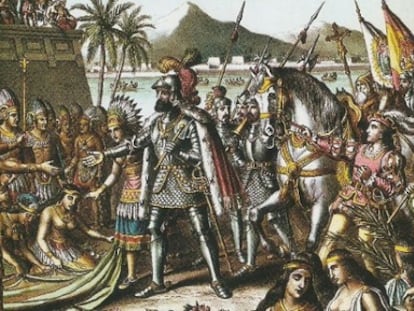Were the Aztecs like the Nazis? Experts probe claim by Spain¡¯s public TV chief
Four history experts criticize controversial comments by RTVE head Jos¨¦ Antonio S¨¢nchez
A speech by the president of Spain¡¯s public broadcaster, RTVE, has caused controversy on both sides of the Atlantic. At a public event at Casa de Am¨¦rica, a cultural center in Madrid, Jos¨¦ Antonio S¨¢nchez said that the Spaniards who colonized the Americas were on an ¡°evangelizing and civilizing mission.¡± He talked of the churches, schools and hospitals that were built, and denied that indigenous populations were deliberately exterminated.
¡°To lament the disappearance of the Aztec Empire is like lamenting the defeat of the Nazis during World War II,¡± said S¨¢nchez, apparently quoting a researcher named Inga Clendinnen whom he described as ¡°an Australian historian who teaches at Cambridge University.¡±
But Clendinnen, who passed away in September 2016, in fact taught at Melbourne University and La Trobe University in Australia. Verne consulted her book Aztecs: An Interpretation, and other essays by her available online, and did not find any sentence to match the RTVE president¡¯s citation.
Spain¡¯s mission in the Americas was chiefly one of conquest and appropriation of territory
Enrique Florescano, Mexican history expert
¡°Inga believed that people, and not just historians, should make an effort to understand how societies interpreted their own actions, especially when these actions included violence and terror,¡± said Barry Carr, a former colleague and academic at La Trobe, in an e-mail exchange with Verne. ¡°She would never pass judgments of that nature; on the contrary, she devoted her career to understanding these societies¡¯ perspective.¡±
We contacted four historians to analyze some of the segments of Jos¨¦ Antonio S¨¢nchez¡¯s address.
1. Spain¡¯s work in the Americas was ¡°evangelizing and civilizing¡±

Enrique Florescano (expert on the history of Mexico and Mesoamerican civilizations): ¡°Spain¡¯s mission in the Americas was chiefly one of conquest and appropriation of territory. Evangelization was carried out by members of the religious orders, who sought to convert the indigenous populations so they would not turn against the conquering armies. This was a minimum element of the intervention, and it was hindered by the Spanish Crown, which prohibited friars from viewing indigenous people as human beings on the same level as Spaniards.¡±
Enrique Rodr¨ªguez (researcher at Texas University, specializing in Mesoamerica and the Spanish Empire in Latin America): ¡°To call the conquest a civilizing project is not a notion that most people will agree with today. We know that indigenous populations in America, the Aztecs and others, had a lot of scientific knowledge, and knew about poetry and art. To say that Spain brought civilization is tho show ignorance.¡±
Miguel Pastrana (member of the Institute of Historical Research at the National Autonomous University of Mexico): ¡°We need to restore cultural dialogues and not view indigenous groups are merely passive. They were creative agents who developed their own strategies. The?Tlaxcalans were allies of [Spanish conquistador Hern¨¢n] Cort¨¦s. This vision is a lot more dynamic, and it goes beyond the Hollywood-like heroic visions that explain nothing. History reveals a more complex relationship of mutual adaptation on the basis of certain interests.¡±
Rosario Sevilla (research professor at the School of Hispanic-American Studies in Seville): ¡°At that time, some people believed in Spain¡¯s ¡®evangelizing¡¯ and ¡®civilizing¡¯ work. But the historical process cannot be reduced to that, while ignoring its colonizing nature. To exclusively highlight some of those components, while ignoring the others, implies offering a partial, one-sided version of events.¡±
When people think about the Aztecs, especially outside Mexico, they always think about the sacrifices and nothing else
Enrique Rodr¨ªguez, Texas University
2. ¡°Inga Clendinnen says: ¡®To lament the disappearance of the Aztec Empire is more or less like lamenting the Nazi defeat at World War II.¡±
Florescano: ¡°Inga was deeply admiring of, and knowledgeable about, the Aztec civilization and culture. Her book on the conquest of Mexico is excellent. She cannot have said that. It is a profoundly reactionary statement, and contrary to all historical truth. She made very valuable contributions to the reassessment of indigenous culture.¡±
Rodr¨ªguez: ¡°When people think about the Aztecs, especially outside Mexico, they always think about the sacrifices and nothing else. They don¡¯t know that they had great poets, painters, engineers and sculptors. I don¡¯t see any reason to defend the Nazis, but I also don¡¯t see any reason to condemn the Aztecs without taking into account the rich variety of their civilization. I think there is nothing to learn from the comparison.¡±
Pastrana: ¡°To compare the Aztecs with the Nazis is outrageous, anachronistic and senseless. It¡¯s like comparing [16th-century Spanish king] Philip II with Stalin: it would be silly. Making comparisons out of context, with no academic backing, is quite inappropriate if what we¡¯re trying to do is understand and explain historical processes.¡±
Sevilla: ¡°The Aztec empire subjugated other Mexican communities and committed acts of cruelty, but it was characteristic of an era when states were formed that way. To mix up the Nazi era with the Aztec era seems like nonsense to me. They are different periods, with different life visions, different stages of social development, and different levels of cultural and scientific progress. You cannot compare them under any circumstances.¡±
3. ¡°Does it make any sense to say that Spaniards of the era went to the Americas in order to exterminate human beings? Spaniards who went to the Americas (...) lived in a country full of cathedrals, where Don Quixote was being written by Cervantes, where the Italian painter Titian was painting and where Hieronymus Bosch paintings were on display.
Florescano: ¡°This gentleman makes a terrible historical comparison. He confuses the things that were happening in an enlightened Spain during its Golden Age with the actions that were committed by soldiers and tradesmen ¨C many of whom were illiterate ¨C and who conquered the land through terribly bloody acts. It is not possible to compare both realities.¡±
Rodr¨ªguez: ¡°He is right that they did not want to exterminate indigenous people, because they wanted to enslave them instead. Exploitation was such that many of them died of disease and abuse suffered while working.¡±
To compare the Aztecs with the Nazis is outrageous, anachronistic and senseless Miguel Pastrana, historian
Pastrana: ¡°The Bosch paintings were reserved inside the King¡¯s chambers. They were not destined for the people, but for an individual and his immediate circle.¡±
Sevilla: ¡°In Spain, cathedrals were being built, books written and paintings painted, but that does not mean that the people who went to the Americas did so too. That is absurd. The Americas also had cultural progress, and it is not correct to say that one civilization was superior to the other. That involves a kind of paternalism that is still very common these days.¡±
4. ¡°We were possibly the most important empire that ever existed, and that is precisely why we suffer from the black legend about a backward, barbarian people who exterminated the indigenous populations and ravaged their culture. All empires have had their legend.¡±
Florescano: ¡°He is essentially defending imperialism. In all cases, empires have conquered territories and enslaved populations. The speech reveals a complete ignorance of history and an imperialist spirit.¡±
Rodr¨ªguez: ¡°The black legend [which posits that Spain was a victim of propaganda carried out by other European powers] did not come out of nowhere, either. And this gentleman is trying to replace a not-very-complex legend with another equally simplistic one. To say that Spaniards were merely civilizing and evangelizing agents is just another piece of fiction. It seems ironic that at this stage of the game there is someone who is trying to glorify an empire.¡±
Pastrana: ¡°It¡¯s interesting, because he complains about the exact same thing that he is doing: denying a culture, a civilization. To recognize that there were excesses and massacres is not to deny the whole of the contribution. The wealth of the Spanish Empire was created precisely through the Americas: before that, we couldn¡¯t talk about a Spanish Empire.¡±
Sevilla: ¡°I don¡¯t think that the Spanish Empire was the biggest there has been. But besides that, the black legend is rooted in reality. There are typically two major lines of rhetoric on that subject: the one that minimizes the atrocities, and the one that only talks about them and nothing else. I don¡¯t think that, in general, you can talk about a deliberate extermination, except in specific locations, but we cannot ignore the barbarities that were committed, either. To discuss them should not be viewed as an attack against Spain, but as one more fact that defines that era.¡±
English version by Susana Urra.
Tu suscripci¨®n se est¨¢ usando en otro dispositivo
?Quieres a?adir otro usuario a tu suscripci¨®n?
Si contin¨²as leyendo en este dispositivo, no se podr¨¢ leer en el otro.
FlechaTu suscripci¨®n se est¨¢ usando en otro dispositivo y solo puedes acceder a EL PA?S desde un dispositivo a la vez.
Si quieres compartir tu cuenta, cambia tu suscripci¨®n a la modalidad Premium, as¨ª podr¨¢s a?adir otro usuario. Cada uno acceder¨¢ con su propia cuenta de email, lo que os permitir¨¢ personalizar vuestra experiencia en EL PA?S.
?Tienes una suscripci¨®n de empresa? Accede aqu¨ª para contratar m¨¢s cuentas.
En el caso de no saber qui¨¦n est¨¢ usando tu cuenta, te recomendamos cambiar tu contrase?a aqu¨ª.
Si decides continuar compartiendo tu cuenta, este mensaje se mostrar¨¢ en tu dispositivo y en el de la otra persona que est¨¢ usando tu cuenta de forma indefinida, afectando a tu experiencia de lectura. Puedes consultar aqu¨ª los t¨¦rminos y condiciones de la suscripci¨®n digital.











































